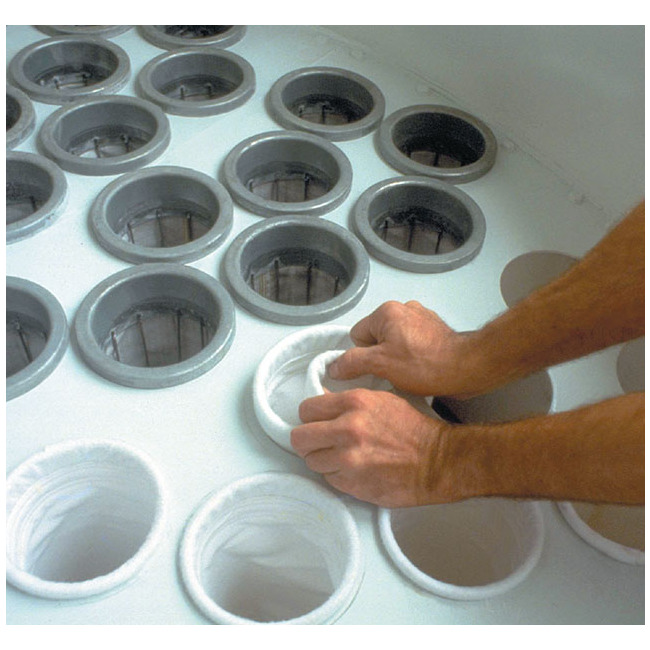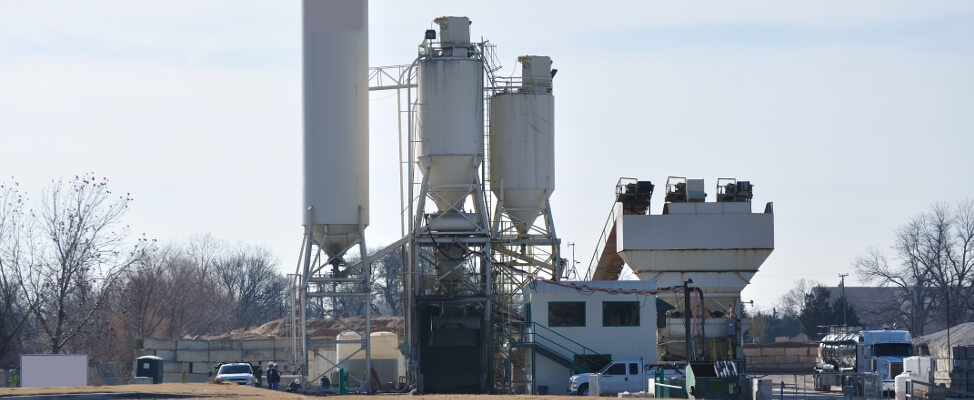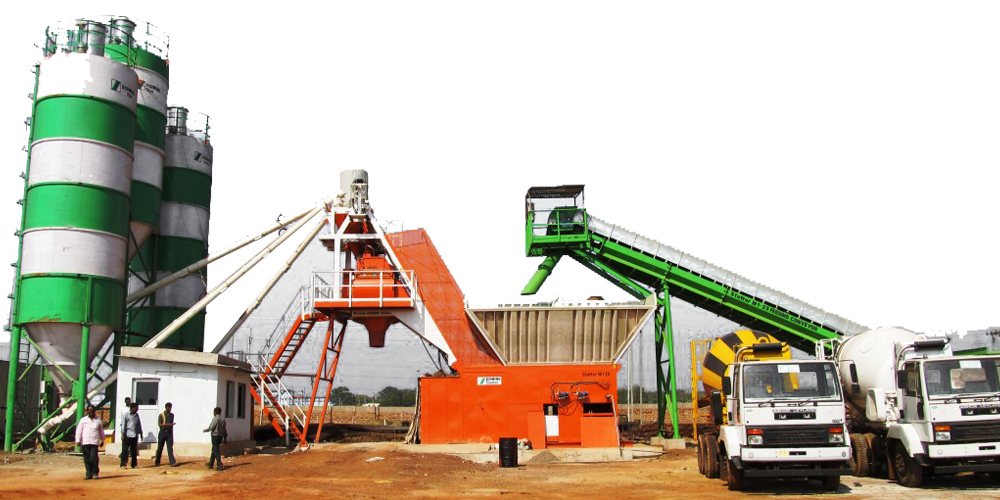Introduction

Dust collectors are important in a cement production factory because they help to control and reduce the amount of dust and particulate matter that is generated during the cement production process. These particulates can be harmful to the health of workers if inhaled, and they can also contribute to air pollution. By using dust collectors to capture and remove these particulates, cement factories can create a safer and cleaner work environment, as well as reduce their impact on the environment.
There are several different types of dust collectors that can be used in a cement production factory, including fabric filter dust collectors, wet scrubbers, and electrostatic precipitators.
Fabric filter dust collectors, also known as baghouses, use a filter made of fabric or other porous material to capture dust particles from the air. They are effective at removing fine dust particles and can be used for a variety of applications.
Wet scrubbers use water to capture dust particles from the air. They are effective at removing large dust particles and are often used in industries where the dust particles are hazardous or toxic.
Electrostatic precipitators use an electric charge to capture dust particles from the air. They are effective at removing a wide range of dust particles and are often used in cement production factories because of their high efficiency.
In addition to protecting the health and safety of workers, using dust collectors can also have economic benefits for cement factories. By reducing the amount of dust and particulates that are released into the environment, factories can help to reduce the risk of fines and other penalties for violating air quality regulations. Additionally, by creating a safer and more pleasant work environment, factories can potentially reduce absenteeism and turnover, which can help to improve productivity and reduce costs.
In this article, we will discuss the various types of dust collectors that can be used in a cement production factory, as well as the importance of each. We will also explore the various benefits of using dust collectors, including improved air quality, compliance with regulations, and increased efficiency.
Improved air quality
Improved air quality is one of the most important benefits of using dust collectors in a cement production factory. Dust collectors help to improve the air quality within a cement production factory by removing dust particles from the air.
Dust particles in the air can pose a health hazard to workers, who may inhale the particles and develop respiratory issues. Dust in the air can also reduce visibility, making it more difficult for workers to see what they are doing. By removing dust particles from the air, dust collectors can help to improve the air quality within the factory and protect the health of the workers.
In addition to improving the air quality for the workers, dust collectors can also help to improve the air quality in the surrounding area. Cement production factories can emit dust particles into the air, which can have negative impacts on the environment and the health of people living in the surrounding area. By using dust collectors, a cement production factory can reduce the amount of dust it emits, improving the air quality in the surrounding area.
Overall, improved air quality is a crucial benefit of using dust collectors in a cement production factory. It helps to protect the health of the workers and can also improve the air quality in the surrounding area.
Compliance with regulations

Many countries have regulations in place to control the amount of dust that is emitted from factories. These regulations are put in place to protect the environment and the health of people living in the surrounding area. Dust collectors can help cement production factories to comply with these regulations and avoid fines or other penalties.
By using dust collectors, a cement production factory can reduce the amount of dust it emits, helping it to comply with these regulations. If a cement production factory does not comply with these regulations, it may face fines or other penalties. In addition, a cement production factory that is not in compliance with regulations may have a negative reputation, which can impact its business.
Using dust collectors can also help a cement production factory comply with any voluntary environmental standards or certifications that it may be working towards. This can help the factory to improve its sustainability and reduce its environmental impact.
Compliance with regulations is an important benefit of using dust collectors in a cement production factory. It helps the factory to operate within the law and protect the environment and the health of people in the surrounding area.
Improved efficiency
Dust in the air can reduce visibility and make it more difficult for workers to see what they are doing. This can lead to mistakes and slow down the production process. By removing dust from the air, dust collectors can improve visibility and help workers to work more efficiently.
Dust collectors can also help to improve the efficiency of the production process by reducing the amount of dust that accumulates on equipment. Dust can cause equipment to malfunction or break down more frequently, which can lead to downtime and reduced efficiency. By reducing the amount of dust in the air, dust collectors can help to extend the lifespan of the equipment and reduce the frequency of maintenance.
Improved efficiency can help to reduce mistakes, improve visibility, and extend the lifespan of the equipment, all of which can increase the efficiency of the production process.
Increased lifespan of equipment

Dust can wear down and damage equipment over time. Dust collectors can help to reduce the amount of dust in the air, which can extend the lifespan of the equipment. The increased lifespan of equipment is an important benefit of using dust collectors in a cement production factory.
Dust can accumulate on equipment and wear it down over time, leading to reduced efficiency and the need for frequent maintenance or replacement. By removing dust from the air, dust collectors can help to reduce the amount of dust that accumulates on the equipment, extending its lifespan.
In addition to extending the lifespan of the equipment, dust collectors can also help to reduce the frequency of maintenance. Dust can cause equipment to malfunction or break down more frequently, which can lead to increased maintenance costs. By reducing the amount of dust in the air, dust collectors can help to lower the frequency of maintenance and reduce the overall maintenance costs of the equipment.
Overall, the increased lifespan of equipment is a key benefit of using dust collectors in a cement production factory. It can help to extend the useful life of the equipment, reduce the frequency of maintenance, and lower maintenance costs.
Reduced maintenance costs
Dust can cause equipment to malfunction or break down more frequently, which can lead to increased maintenance costs. Dust collectors can help to reduce the amount of dust in the air, which can lower maintenance costs. Reduced maintenance costs is very important when using dust collectors in a cement production factory.
Dust can accumulate on equipment and cause it to malfunction or break down more frequently, leading to increased maintenance costs. By removing dust from the air, dust collectors can help to reduce the amount of dust that accumulates on the equipment and lower the frequency of maintenance.
In addition to reducing the frequency of maintenance, dust collectors can also help to lower the cost of maintenance when it is required. Dust can be difficult to clean and remove, which can increase the time and cost of maintenance. By reducing the amount of dust in the air, dust collectors can make maintenance tasks easier and more efficient, resulting in lower maintenance costs.
Improved Cement Quality

Dust in the air can contaminate cement, leading to lower quality. Dust collectors can help to ensure that cement is not contaminated by dust, resulting in higher quality.
For example, if dust particles get into cement as it is being produced, it can weaken the final product and reduce its quality. By removing dust from the air, dust collectors can help to ensure that products are not contaminated by dust, resulting in higher quality.
Improved product quality can also lead to increased customer satisfaction and loyalty. Customers are more likely to purchase high-quality products and return to the company for future purchases. This can lead to increased sales and revenue for the cement production factory.
Overall, improved product quality is a key benefit of using dust collectors in a cement production factory. It can help to ensure that the final products are not contaminated by dust, leading to increased customer satisfaction and loyalty.
Reduced fire risk
Dust can accumulate and create a fire hazard. Dust collectors can help to reduce the amount of dust in the air, which can lower the risk of a fire. Dust can accumulate and create a fire hazard, especially in areas where there are high temperatures or sparks. By removing dust from the air, dust collectors can help to reduce the risk of a fire starting.
In addition to reducing the risk of a fire starting, dust collectors can also help to prevent the spread of a fire if one does occur. Dust in the air can fuel a fire and make it more difficult to extinguish. By reducing the amount of dust in the air, dust collectors can help to slow the spread of a fire and make it easier to extinguish.
Reducing fire risk is very important which can be achieved by using dust collectors in a cement production factory. It can help to prevent fires from starting and slow the spread of a fire if one does occur, improving the safety of the factory and its workers.
Improved working conditions

Dust in the air can make it more difficult for workers to breathe and can cause irritation to the eyes and skin. Dust collectors can help to improve working conditions by reducing the amount of dust in the air. By removing dust from the air, dust collectors can help to improve the air quality within the factory and make it a more comfortable place to work.
Improved working conditions can also lead to increased productivity and employee satisfaction. Workers who are exposed to dust and poor air quality may be less productive and more likely to leave their job. By improving the air quality and reducing the amount of dust in the air, dust collectors can help to create a more pleasant and comfortable work environment, which can lead to increased productivity and employee satisfaction.
Improved working conditions can help to create a more comfortable and pleasant work environment, leading to increased productivity and employee satisfaction.
Improved reputation
A cement production factory with good air quality and working conditions can have a better reputation, which can lead to increased business. Customers and clients may be more likely to purchase products from or work with a company that is known for its good working conditions and commitment to environmental sustainability.
In addition, a cement production factory with a good reputation may be more attractive to potential employees. Workers may be more likely to apply for jobs at a company that is known for its good working conditions and commitment to the health and safety of its employees. This can lead to increased employee retention and lower recruitment costs.
Overall, improved reputation is a key benefit of using dust collectors in a cement production factory. It can lead to increased business and make the company more attractive to potential employees, both of which can have a positive impact on the bottom line.
Increased employee retention
Workers who are exposed to dust and poor air quality may be more likely to leave their job. By improving the air quality and reducing the amount of dust in the air, dust collectors can help to create a more pleasant and comfortable work environment, which can lead to increased employee satisfaction and retention.
Increased employee retention can have a number of benefits for the cement production factory. It can reduce the costs associated with recruitment and training, as the company will not have to replace departing employees as frequently. It can also improve the overall efficiency and productivity of the company, as new employees often require a period of time to become fully trained and productive.
Generally, increasing employee retention is a concern when using dust collectors in a cement production factory. It can help to create a more pleasant and comfortable work environment, leading to increased employee satisfaction and lower recruitment and training costs.
Buying dust collectors for your cement production factory

Buying dust collectors for a cement production factory can be a worthwhile investment, as they can help to reduce the amount of dust in the air, improve working conditions, and create a more pleasant and comfortable work environment. However, there are a few things you should consider before making the purchase.
First, it is important to consider the type of dust collectors that are best suited to your needs. Different types of dust collectors are available, with various features and capabilities. Make sure to research each type of dust collector and select the one that best meets your requirements.
Second, you should consider the cost of the dust collectors. Different types of dust collectors can have vastly different prices, so it is important to compare different options and determine which one will be the most cost-effective for your particular needs.
Finally, it is important to consider the maintenance and upkeep of the dust collectors. Make sure that you select a unit that will require minimal maintenance and can be easily serviced if any repairs are needed.
Buying dust collectors for a cement production factory can be a worthwhile investment, as they can help to reduce the amount of dust in the air and create a more pleasant and comfortable working environment.
Sofilt dust collectors for cement production factory
Sofilt has been rated as one of the best manufacturers of high quality industrial dust collectors. Their products are designed to remove dust particles from industrial environments and can be used in a cement production factory for improved air quality.
Sofilt’s dust collectors come in several models, with different capabilities and features. We export to various countries in the world. The main benefits of Sofilt dust collectors include:
High efficiency — Sofilt’s dust collectors can capture up to 99.9% of airborne particles, ensuring that your cement production factory is free from hazardous levels of dust.
Low maintenance — these industrial-grade dust collectors are designed for minimal maintenance, so you won’t need to worry about spending too much time and money on upkeep.
Durability — the heavy-duty construction of these dust collectors ensures that they can stand up to rough environments.
If you are looking for high quality dust collectors for your cement production factory, Sofilt is an excellent choice. Our products are designed to provide optimal performance in an industrial setting and can help you create a more pleasant and safe work environment. Contact us today for more information.
Conclusion

Dust collectors in a cement production factory can be a worthwhile investment, as they can help to reduce the amount of dust in the air and create a more pleasant and comfortable working environment for employees. When selecting a dust collector for your cement production factory, it is important to consider the type of dust collector that best meets your needs, the cost of the dust collectors, and their maintenance requirements.
Sofilt is one of the leading manufacturers of industrial-grade dust collectors, and our products can help you to create a safer and more pleasant work environment for your employees. Contact us today to learn more about our products and services.




